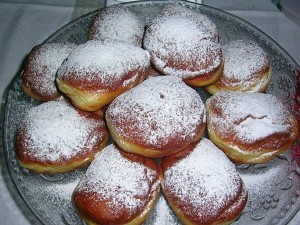Mr. Ravui’s devotion to Jewish tradition includes a robust embrace of the culinary, with less emphasis on the moral dimension.
 Ramat HaSharon, December 6 – A local resident whose regular culinary habits consist of such dishes as falafel, kubbeh, French fries, sabih, chicken schnitzel, pancakes, and mozzarella sticks believes his cultural observance of the Jewish Festival of Lights via the consumption of foodstuffs cooked in large quantities of oil represents an increase in his consumption of such items compared to the rest of the year, when in fact the amount remains more or less consistent.
Ramat HaSharon, December 6 – A local resident whose regular culinary habits consist of such dishes as falafel, kubbeh, French fries, sabih, chicken schnitzel, pancakes, and mozzarella sticks believes his cultural observance of the Jewish Festival of Lights via the consumption of foodstuffs cooked in large quantities of oil represents an increase in his consumption of such items compared to the rest of the year, when in fact the amount remains more or less consistent.
Shuman Ravui, 35, enjoys Hanukkah cuisine because it features a plethora of fried foods, and he embraces the fiction that his eating such hallmark treats of the holiday such as donuts and potato latkes constitutes a departure from his regular diet. His favorite Hanukkah foods include the aforementioned latkes and the donuts known in Hebrew as sufganiyot, but Mr. Ravui also makes sure to partake of the more ethnic Mizrahi treat of sfinj, another kind of deep-fried dough characteristic of the Hanukkah cuisine of Jews from the Levant and North Africa, in contrast to the deep-fried foods he eats with abandon the other 346 days of the typical Jewish year.
“I love Hanukkah,” he gushed in an interview at a neighborhood bakery that produces two dozen varieties of sufganiyot. “I know I’m being bad, health-wise, by indulging in so much fried stuff, but eight days a year it’s OK. It’s practically an obligation in our tradition, you know.” Mr. Ravui’s devotion to Jewish tradition includes a robust embrace of the culinary, with less emphasis on the moral, theological, or anything involving significant expense or discomfort.
The custom of eating foods fried in oil on Hanukkah stems from the Talmud’s account of the festival’s origins, a passage that describes how a flask of oil, containing a single night’s quantity of oil to light the Holy Temple’s candelabrum, and the only one left unsullied by the depredations of pagan oppressors and their Jewish sympathizers, lasted eight nights. Jewish tradition has long incorporated specific foods into the commemoration and reliving of formative episodes, in this case anything cooked in copious amounts of oil.
Ravui looks forward to the festival of Purim, as well, which endorses drinking to the point that one cannot distinguish between “cursed is Haman,” referring to the villain of the Purim story, and “blessed is Mordechai,” one of its heroes, indicating he believes in error that his alcohol consumption on that day differs appreciably from any other day.
Please support our work through Patreon.




